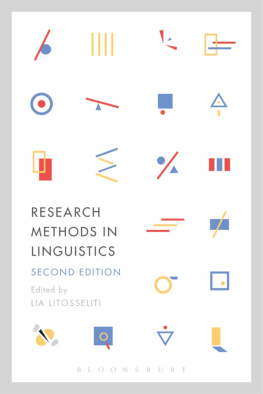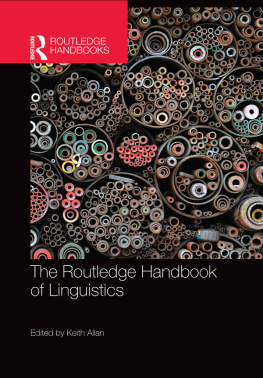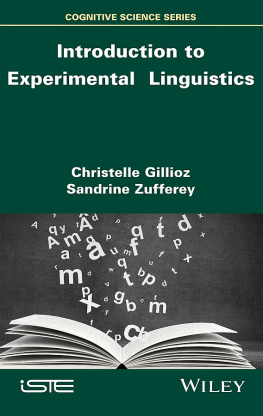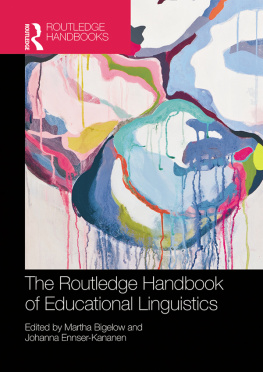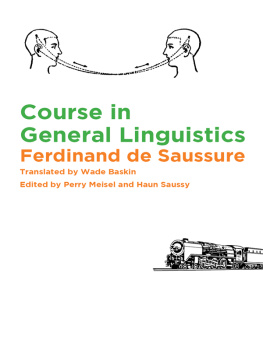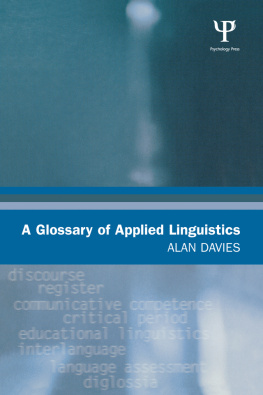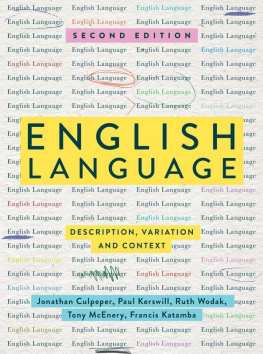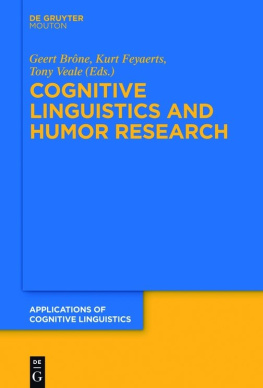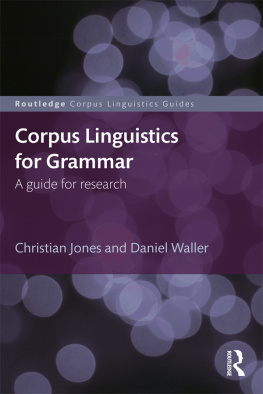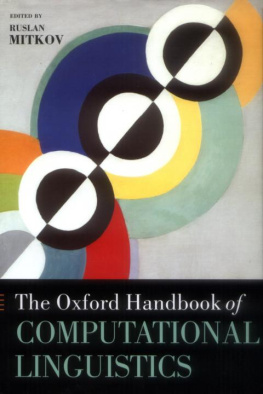Lia Litosseliti - Research Methods in Linguistics
Here you can read online Lia Litosseliti - Research Methods in Linguistics full text of the book (entire story) in english for free. Download pdf and epub, get meaning, cover and reviews about this ebook. year: 2019, publisher: Bloomsbury, genre: Children. Description of the work, (preface) as well as reviews are available. Best literature library LitArk.com created for fans of good reading and offers a wide selection of genres:
Romance novel
Science fiction
Adventure
Detective
Science
History
Home and family
Prose
Art
Politics
Computer
Non-fiction
Religion
Business
Children
Humor
Choose a favorite category and find really read worthwhile books. Enjoy immersion in the world of imagination, feel the emotions of the characters or learn something new for yourself, make an fascinating discovery.
- Book:Research Methods in Linguistics
- Author:
- Publisher:Bloomsbury
- Genre:
- Year:2019
- Rating:5 / 5
- Favourites:Add to favourites
- Your mark:
- 100
- 1
- 2
- 3
- 4
- 5
Research Methods in Linguistics: summary, description and annotation
We offer to read an annotation, description, summary or preface (depends on what the author of the book "Research Methods in Linguistics" wrote himself). If you haven't found the necessary information about the book — write in the comments, we will try to find it.
Research Methods in Linguistics — read online for free the complete book (whole text) full work
Below is the text of the book, divided by pages. System saving the place of the last page read, allows you to conveniently read the book "Research Methods in Linguistics" online for free, without having to search again every time where you left off. Put a bookmark, and you can go to the page where you finished reading at any time.
Font size:
Interval:
Bookmark:
Research
Methods in
Linguistics
ALSO AVAILABLE FROM BLOOMSBURY
Research Methods in Interpreting, by Sandra Hale
Research Methods in Applied Linguistics, edited by Brian Paltridge and Aek Phakiti
Experimental Research Methods in Sociolinguistics, by Katie Drager
Research
Methods in
Linguistics
Second edition
By Lia Litosseliti

For Judith Baxter, in memoriam
Jo Angouri is Professor and Director of Undergraduate Studies in Applied Linguistics at the University of Warwick, UK, and a Visiting Distinguished Professor at Aalto University, School of Business, Finland. Jo is co-directing two international research networks, one under the Warwick-Monash alliance on Migration Identity and Translation and one under AILA on Migrants in Working Life. Jo has had visiting positions in institutions in Europe, New Zealand and Australia. Her research expertise is in sociolinguistics, pragmatics and critical discourse analysis. Her current work focuses on boundary crossing, workplace interaction, multilingualism, and political discourse and ideology. In the last ten years Jo has published 60 refereed papers, 3 special issues, 2 books, 3 edited volumes and 2 conference proceedings. Jo has recently completed a monograph on Culture,Discourse, and the Workplace (Routledge, 2018) and has co-edited a volume on Negotiating Boundaries at Work (2017, EUP- with Janet Holmes and Meredith Marra). Jo is the founding editor of Language at Work series (Multilingual Matters) and is also co-editing Discourse Approaches to Politics, Society and Culture for John Benjamins.
Paul Baker is Professor of English Language at Lancaster University. His research areas include corpus linguistics, critical discourse analysis and language, gender and sexuality. He has published fifteen books, including Using Corpora to Analyse Gender (2014), Sexed Texts (2008), Using Corpora in Discourse Analysis (2006), Public Discourses of Gay Men (2005) and Polari: The Lost Language of Gay Men (2002). He is the commissioning editor for the journal Corpora. He has taught corpus linguistics and research methods in corpus linguistics in Lancaster and Hong Kong.
Judith Baxter, Emeritus Professor of Applied Linguistics at Aston University, sadly passed away as this book was going to print. She will be fondly remembered by students, colleagues and collaborators (including many of this books contributors) as an inspiring scholar whose work enriched the fields of language, gender, leadership and discourse analysis. Judith played a key role in developing the discourse-analytical method of feminist poststructuralist discourse analysis (FPDA). She authored Positioning Gender in Discourse: A Feminist Methodology (2003); The Language of Female Leadership (2010); Double-Voicing at Work: Power, Gender and Linguistic Expertise (2014); and with Haleema Al Aali, Speaking as Women Leaders: Meetings in Middle Eastern and Western Contexts (2016) and Women Leaders and Gender Stereotyping in the UK Press (2018).
Jeff Bezemer is Reader in Learning and Communication and Co-Director of the Centre for Multimodal Research at UCL Institute of Education. He is interested in meaning making, communication and learning; and in exploring how video-based ethnography and micro-analysis can contribute to our understanding of social interaction situated in complex work environments. His current research is focused on clinical education, health services delivery, patient safety and improvement initiatives. This work also feeds into the development of new theories and methods for investigating multimodality, the body, and tools and technologies in teamwork and inter-professional communication. Recent book publications include Multimodality, Learning and Communication: A Social Semiotic Frame (with Gunther Kress) and Introducing Multimodality (with Carey Jewitt and Kay OHalloran).
Fiona Copland is Professor of TESOL and Associate Dean for Research in the Faculty of Social Sciences at the University of Stirling. She researches in the areas of teacher education, teaching English to young learners and linguistic ethnography. With Angela Creese, she is author of Linguistic Ethnography: Collecting, Analysing and Presenting Data and an editor of Linguistic Ethnography:Iinterdisciplinary Explorations.
Angela Creese is Fellow of the Academy of Social Sciences and Professor of Educational Linguistics at the School of Education, University of Birmingham. She is also Deputy Director of the MOSAIC Centre for Research on Multilingualism. Her current role is principal investigator of Translation and Translanguaging: Investigating Linguistic and Cultural Transformations in Superdiverse Wards in Four UK Cities (http://www.birmingham.ac.uk/research/activity/education/translation-and-translanguaging/index.aspx). Her research interests are in linguistic ethnography, language ecologies, multilingualism in society and multilingual classroom pedagogy.
Patricia A. Duff is an applied linguist, Distinguished University Scholar, and Professor of Language and Literacy Education at the University of British Columbia. Her main scholarly interests are related to language socialization across bilingual and multilingual settings; qualitative research methods in applied linguistics (especially case study and ethnography); issues in the teaching, learning and use of English, Mandarin and other international languages in transnational contexts; the integration of second-language learners in schools, universities and society; multilingualism and work; and sociocultural, sociolinguistic and sociopolitical aspects of language(s) in education. She has published and lectured widely on these topics.
Nigel Edley is Senior Lecturer in Social Psychology at Nottingham Trent University. Having completed both a BSc and a PhD in social psychology at Loughborough University, he went on to work for the Open University as a Research Fellow on an Economic and Social Research Council (ESRC)-funded project looking at the discursive construction of men and masculinity. Nigels research interests are centred around the topics of gender, identity and subjectivity, as well as discourse analysis and social constructionism. Author of Men and Masculinity: The Basics and co-author (with Margaret Wetherell) of Men in Perspective: Practice Power and Identity, he has also published numerous articles in journals including Theory and Psychology, Feminism and Psychology, and The Psychology of Men and Masculinity.
Carey Jewitt is Professor of Learning and Technology and Director of UCL Knowledge Lab, University College London. Her research is at the frontier of theorizing communication in a multimodal digital landscape. She has led a number of large projects, as principal investigator of IN-TOUCH: Digital Touch Communication (an ERC Consolidator Award) and Director of MODE Multimodal Methods for Researching Digital Data and Environments (ESRC). Carey was a founding editor of the journal Visual Communication (Sage) and publishes widely on multimodal theory and research. Her books include Introducing Multimodality (2016) with Jeff Bezemer and Kay OHalloran, The Sage Handbook of Researching Digital Technologies (2013) with Sara Price and Barry Brown, and The Routledge Handbook of Multimodal Analysis (second edition) (2013).
Erez Levon is Reader in Sociolinguistics at Queen Mary University of London. His work uses quantitative, qualitative and experimental methods to explore patterns of socially meaningful variation in language use.
Next pageFont size:
Interval:
Bookmark:
Similar books «Research Methods in Linguistics»
Look at similar books to Research Methods in Linguistics. We have selected literature similar in name and meaning in the hope of providing readers with more options to find new, interesting, not yet read works.
Discussion, reviews of the book Research Methods in Linguistics and just readers' own opinions. Leave your comments, write what you think about the work, its meaning or the main characters. Specify what exactly you liked and what you didn't like, and why you think so.

